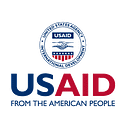African Entrepreneurs Are Creating More Responsive, Accessible Health Systems
By April Warren, LHSS Project Senior Technical Advisor — Private Sector Engagement
In October, I participated in a forum not typically frequented by health systems strengthening practitioners. The Social Capital Conference (SOCAP) convenes global investors, corporations, venture philanthropists, entrepreneurs, policy makers, and nonprofit leaders seeking to solve the world’s greatest challenges by deploying capital in new ways. Amidst the crises of Covid-19 and racial injustice, private capital players were newly awake to possibilities for investing in more equitable, resilient health systems.
Representing USAID’s Local Health System Sustainability Project (LHSS), I moderated a virtual panel on health care innovation and Covid-19, featuring two African health entrepreneurs currently receiving support from LHSS. Four key takeaways emerged:
1) Locally-led, private sector enterprises are using technology to address some of sub-Saharan Africa’s most pressing health challenges.
Panelist Conrad Tankou founded GIC Space to tackle some of Africa’s biggest challenges. One of these challenges is the high morbidity and mortality due to breast and cervical cancers — problems caused by limited access to screening and diagnosis and shortages of qualified health care workers. Tankou and his team developed GICMed, which enables frontline health workers in rural areas to screen women with the support of remote specialists who can provide diagnoses from anywhere in the world. This is made possible by technologies built in-house, including smartphone digital microscopy and colposcopy systems, and a telemedicine platform.
Another example is Nigeria’s mDoc, a social enterprise that harnesses technology, behavioral science, quality improvement, and data to improve the care experience for people living with chronic diseases. mDoc co-founder Nneka Mobisson noted that 28 million people in sub-Saharan Africa have died prematurely of chronic diseases in the past decade — a toll projected to grow dramatically in coming years. mDoc’s four-pronged approach includes: 1) connecting people to multidisciplinary care teams that provide digital, behavioral nudges; 2) in-person “nudge hubs” where customers can get personal support; 3) a geo-coded directory of health facilities to link customers to care; and 4) tele-education and in-person training for health care providers to ensure high-quality care.
2) Local innovators leveraging digital technology were uniquely prepared to adapt and support the response to Covid-19 in their countries.
Before Covid-19, mDoc and GICMed relied on in-person touch points with patients and health care workers. But both were able to adapt rapidly to shutdowns and social distancing by leveraging their technology platforms. When health facilities closed or reduced services, mDoc became a 24/7 point of contact for patients with fears and urgent care needs. Pregnant women, a key customer segment for mDoc, were able to use mDoc to speak with their health coaches, decide whether their symptoms warranted a visit to a health practitioner, and find medical facilities that were open.
To support the broader health system, both GICMed and mDoc strengthened their e-learning capabilities, safely providing information to health care workers and patients. In the future, these capabilities will help their businesses scale more quickly and at a lower cost. Both panelists acknowledged a silver lining to Covid-19: a stronger recognition of the value and necessity of digital health solutions, and evidence that these solutions work in low-income, low digital literacy contexts.
3) Health enterprises need patient capital, partnerships, and support to build the systems needed to scale.
Tankou and Mobisson agreed that securing financing is a top barrier to their growth. Mobisson stressed the importance of access to “the right kind of patient capital,” referring to investors that are willing to take risks and give them time to learn, understanding that methods that work in highly developed countries may not apply in their contexts.
Beyond capital, Tankou said, GICMed needs to generate evidence to attract government partnerships and find a way to deal with varied national regulatory systems. Through technical assistance from the LHSS Project, GICMed is refining its business model and creating a standardized process to replicate in new health care facilities. Mobisson said the organizational strategy support provided through the LHSS Project is helping her company build “a robust foundation for scale.”
4) Investors should give more consideration and capital to African founders, who are best placed to meet the needs of their countries.
Both panelists pointed out that it is harder for African than expat founders to raise capital for social ventures in Africa. “If someone is born into a society with a problem and has used his energy and networks to solve that problem, he knows the context best, and that is the best bet for impact investment,” said Tankou, imploring investors to consider African founders. Mobisson urged investors to examine implicit biases that may affect the risk profiles they assign to African founders, and to be more intentional about how and in whom they invest.
I hope their message was heard. After all, it is local entrepreneurs and leaders who are in their countries, responding to Covid-19 now — and who will be there when the next challenge comes, tackling it with whatever resources they have.
About the LHSS Project
The Local Health System Sustainability Project is the United States Agency for International Development’s (USAID’s) flagship initiative in integrated health systems strengthening. Its goal is to help low- and middle-income countries transition to sustainable, self-financed health systems as a means to support access to universal health coverage. The LHSS Project is led by Abt Associates.
